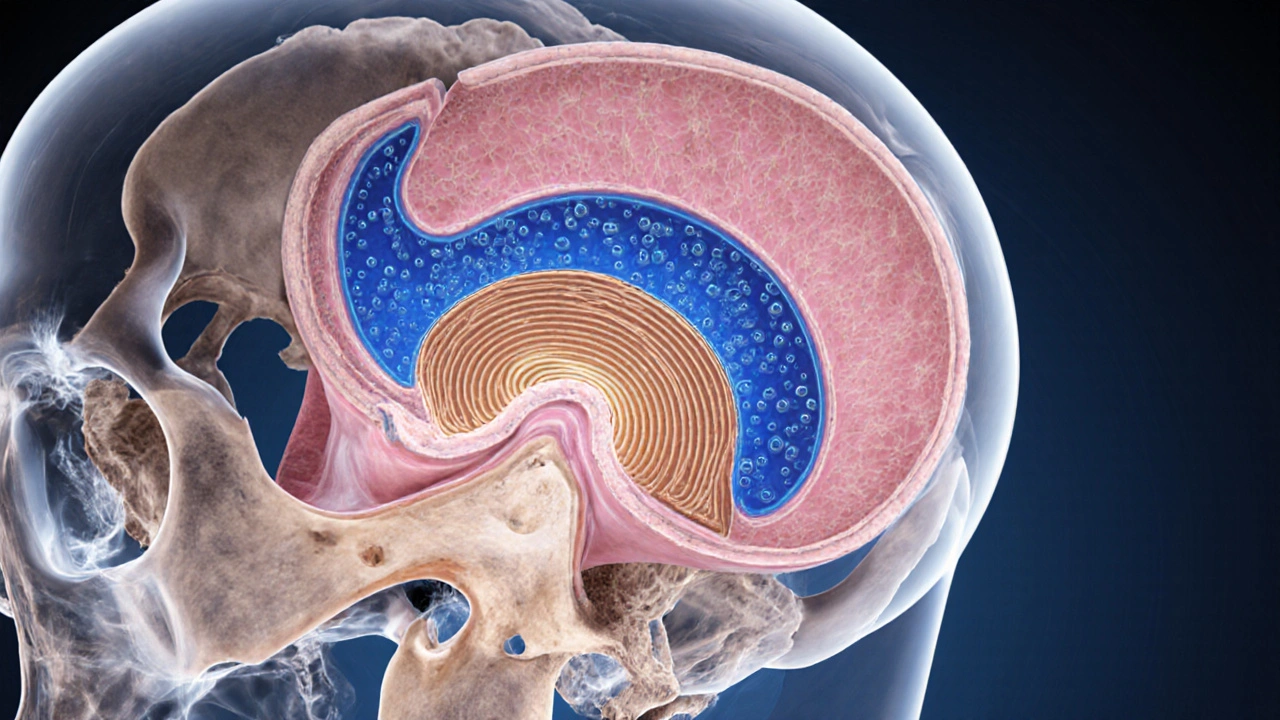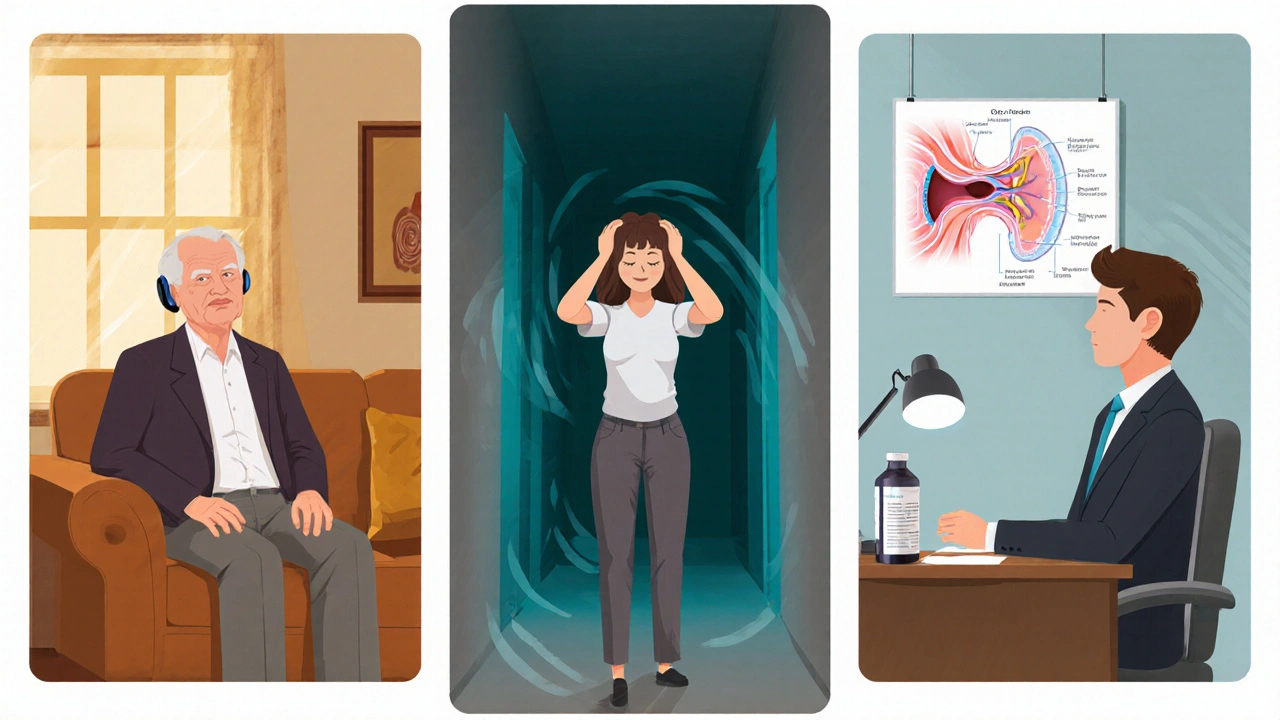
Balance & Hearing Assessment Tool
How are your hearing and balance?
Answer these questions to assess your risk of hearing loss and balance problems. The inner ear controls both functions, so issues often overlap.
Your Assessment
Low Risk
Your hearing and balance appear to be in good condition based on your responses. Continue practicing good hearing health habits like wearing ear protection in noisy environments.
Remember: Early detection is key. Schedule a hearing check if you notice any changes.
Key Takeaways
- The inner ear houses structures that manage both hearing and balance, so problems often affect both.
- Age‑related changes, infections, medication side‑effects, and Meniere’s disease are common culprits.
- Early symptoms include dizziness, unsteady gait, and trouble hearing high‑frequency sounds.
- Seeing an audiologist or ENT specialist can pinpoint the cause and prevent falls.
- Vestibular rehabilitation, hearing aids, and lifestyle tweaks can restore quality of life.
Ever felt a sudden wobble right after you realised you couldn’t hear someone clearly? You’re not alone. hearing loss and balance problems often share the same root because both rely on the delicate anatomy of the inner ear. This article unpacks why the two go hand‑in‑hand, what red‑flags to watch for, and how you can keep both your ears and your steadiness in shape.
How the Ear Controls Both Hearing and Balance
The inner ear is a tiny marvel. It contains two main chambers: the cochlea, which translates sound waves into nerve signals, and the vestibular system, a trio of semicircular canals filled with fluid that detects head movement. When you turn your head, the fluid shifts, flexing tiny hair cells that send balance information through the auditory nerve to the brain. Because these structures sit side‑by‑side, injury, infection, or degeneration can disrupt both hearing and equilibrium simultaneously.
Common Causes Linking Hearing Loss and Balance Problems
Several medical conditions strike both systems at once:
- Age‑related hearing loss (presbycusis): As we age, the hair cells in the cochlea and vestibular organs degrade, leading to muted high‑frequency sounds and poorer balance.
- Meniere's disease: Fluid buildup in the inner ear produces fluctuating hearing, tinnitus, and episodic vertigo.
- Ototoxic medications: Certain antibiotics, chemotherapy agents, and high‑dose diuretics can poison both the cochlea and vestibular hair cells.
- Viral infections (e.g., vestibular neuritis): Inflammation of the vestibular nerve often brings sudden loss of balance and can affect nearby auditory pathways.
- Acoustic trauma: Loud explosions or concerts can rip hair cells, leaving you with hearing gaps and impaired spatial orientation.
Understanding the cause matters because treatment paths differ. For instance, stopping an ototoxic drug may reverse symptoms, while Meniere's disease often requires dietary sodium restriction and vestibular therapy.

Signs You Might Have Both Issues
Because the brain blends sound and motion cues, you may notice a mix of complaints:
- Difficulty hearing conversations in noisy places, especially high‑pitched voices.
- Feeling unsteady when standing up quickly or walking in the dark.
- Frequent episodes of vertigo, the sensation that the room is spinning.
- Tinnitus (ringing) that worsens when you’re moving.
- Increased reliance on visual cues-watching the floor or walls to keep your balance.
If two or more of these appear together, it’s a cue to get checked out before falls become a risk.
When to See a Professional
Not all dizziness means a hearing issue, but the overlap is common enough to merit an early visit. Book an appointment if you experience:
- Sudden or progressive hearing loss in one or both ears.
- Recurrent vertigo lasting more than a few minutes.
- Unexplained falls or stumbling.
- Persistent tinnitus that interferes with sleep.
Both an audiologist and an otolaryngologist (ENT) can run the necessary tests-pure‑tone audiometry, vestibular evoked myogenic potentials (VEMP), and video head impulse testing (vHIT). Early diagnosis often means simpler, less invasive treatment.
Treatment and Management Options
What you’ll hear from specialists depends on the diagnosis:
- Hearing aids or cochlear implants: Modern devices can improve speech perception and also feed spatial cues that aid balance.
- Vestibular rehabilitation: A tailored set of exercises that retrain the brain to compensate for faulty vestibular input.
- Medication: Diuretics for Meniere’s, steroids for sudden sensorineural loss, or antihistamines for motion‑sickness‑type vertigo.
- Dietary changes: Reducing sodium and caffeine can lessen fluid pressure in the inner ear.
- Assistive devices: Canes or balance training programs to lower fall risk during recovery.
Most patients see gradual improvement within weeks to months, especially when therapy starts early.

Prevention Tips and Lifestyle Adjustments
While you can’t rewind aging, you can protect the inner ear:
- Limit exposure to loud noise-use earmuffs at concerts or when using power tools.
- Maintain a balanced diet low in excess sodium; stay hydrated.
- Regular physical activity, especially yoga or tai chi, keeps both muscles and vestibular function sharp.
- Review medication lists with your doctor; ask if any prescriptions are known to be ototoxic.
- Schedule annual hearing checks after age 50, even if you feel fine.
Simple habits can delay the onset of both hearing loss and balance decline, giving you more independence.
Comparison of Common Conditions Affecting Hearing and Balance
| Condition | Primary Hearing Effect | Primary Balance Effect | Typical Onset | Management Focus |
|---|---|---|---|---|
| Presbycusis | Gradual high‑frequency loss | Mild disequilibrium, especially in low light | Gradual, after 60 years | Hearing aids, balance exercises |
| Meniere's disease | Fluctuating low‑frequency loss | Episodes of intense vertigo | Middle age, episodic | Low‑salt diet, vestibular rehab, meds |
| Vestibular neuritis | Usually none | Sudden severe vertigo, nausea | Acute, often post‑viral | Corticosteroids, vestibular rehab |
| Ototoxic drug exposure | Sensorineural loss (dose‑dependent) | Impaired gait, dizziness | During/after treatment | Drug substitution, monitoring |
Frequently Asked Questions
Can hearing aids improve my balance?
Yes. Modern hearing aids amplify spatial cues that the brain uses to orient itself, which can reduce unsteadiness, especially in noisy environments.
Is vertigo always a sign of an ear problem?
Not always. Vertigo can stem from neurological issues, medication side‑effects, or cardiovascular changes. An ear‑focused assessment helps rule out inner‑ear causes first.
How long does vestibular rehabilitation take?
Most people notice improvement after 4‑6 weeks of twice‑weekly sessions, but full adaptation can take 3‑6 months depending on severity.
Are there any home tests for balance problems?
A simple “one‑leg stand” for 30 seconds with eyes closed can flag vestibular weakness. If you sway or feel unsafe, schedule a professional evaluation.
Should I avoid all caffeine if I have inner‑ear issues?
Caffeine can increase fluid pressure in the inner ear for some people, especially those with Meniere’s disease. Cutting back may lessen vertigo episodes, but moderate intake is typically fine for most other conditions.
By keeping an eye on the signals your ears send, you can act fast, protect your balance, and stay on your feet. If any of the symptoms described resonate with you, reach out to a qualified audiologist or ENT doctor today.

 Health and Wellness
Health and Wellness
Gary Levy
October 13, 2025 AT 16:29Keeping your ears healthy goes beyond just shouting at concerts; regular check‑ups can spot early signs of both hearing loss and balance issues. The inner ear’s vestibular system is tightly linked to auditory pathways, so a slight dip in one often hints at trouble in the other.
sourabh kumar
October 25, 2025 AT 20:09if you skip ear protection you gamble with both your hearing and your ability to stay steady on your feet
Christian Miller
November 6, 2025 AT 22:49It is worth noting that many pharmaceutical entities have vested interests in downplaying early detection of auditory and vestibular disorders, thereby encouraging prolonged reliance on expensive treatments. Consequently, independent screening tools acquire heightened importance.
NORMAND TRUDEL-HACHÉ
November 19, 2025 AT 02:29Tasteful insights, indeed.
AJIT SHARMA
December 1, 2025 AT 06:09We see a pattern where neglecting simple safety measures leads to a cascade of symptoms-ringing, dizziness, and eventual loss of confidence in everyday movements.
Neber Laura
December 13, 2025 AT 09:49Stop ignoring the signs-act now.
Karen Nirupa
December 25, 2025 AT 13:29One must acknowledge that the symbiotic relationship between auditory acuity and postural stability is deeply rooted in the neurophysiology of the labyrinthine structures, thereby necessitating a holistic approach to preventive care.
Quinn Comprosky
January 6, 2026 AT 17:09Understanding how the vestibular apparatus interacts with auditory nerves can feel overwhelming at first, but consider this: each time you hear a high‑pitched tone, the same delicate hair cells are also sending balance cues to the brain; when these cells deteriorate, you may notice subtle sways while walking, occasional vertigo spells, and a gradual decline in the clarity of sounds, especially in noisy environments. Regular audiometric evaluations combined with balance assessments can map these changes long before they become debilitating, allowing for timely interventions such as hearing aids, vestibular rehabilitation exercises, or environmental modifications.
Tiffany Owen-Ray
January 18, 2026 AT 20:49From a philosophical standpoint, the preservation of our sensory faculties mirrors the broader quest for equilibrium in life; when hearing fades or balance wavers, it reminds us of the impermanence of bodily conditions and the importance of cultivating resilience. Embracing routine screenings, using protective gear in loud settings, and engaging in balance‑enhancing activities like Tai Chi or yoga not only safeguard the senses but also reinforce a mindful connection between mind and body, fostering a more harmonious existence.
Ellie Chung
January 31, 2026 AT 00:29Picture your inner ear as a bustling city where tiny cogs-hair cells-keep the traffic of sound and motion flowing smoothly; when one cog sputters, the whole metropolis trembles, and you feel the world tilt or the music blur.
Sophia Simone
February 12, 2026 AT 04:09Contrary to popular belief, the proliferation of consumer‑grade hearing devices does not necessarily equal better outcomes; in fact, without proper diagnostic backing, such gadgets may mask underlying vestibular pathology, leading users to underestimate the severity of their balance deficits.
Juan Sarmiento
February 24, 2026 AT 07:49Hey, good point! Taking a few minutes each year for a simple hearing and balance check can make a world of difference, especially as we get older.